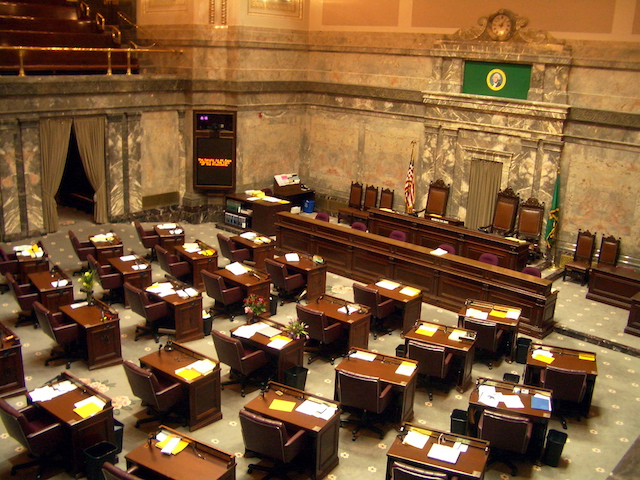Washington Recreational Marijuana Laws: HB 2136 Goes Into Effect TODAY

They took their time, but the Washington legislature finally passed its budget for this biennium. This is good news for those who love regulators, as it means that your favorite Liquor and Cannabis Board (LCB) employees aren’t going to be temporarily laid off. As we expected, the Washington legislature passed HB 2136 and the Governor signed it into law. And we’re not wasting any time–HB 2136 goes into effect today, July 1. As SB 5052 and HB 2136, complimentary bills, now constitute our governing cannabis laws, here’s a rundown of some of the ways in which HB 2136 is going to change Washington State’s cannabis regime:
Taxes: The existing multi-tier tax structure is no more. We now have a 37% excise tax levied at the retail level, and there are no excise taxes for wholesale transactions. The tax is also structured differently in order to better deal with federal income taxes. The tax dollars are now “held in trust” by the retailer for the state, and the responsibility of the tax is placed on the consumer. In practice, this doesn’t really change anything from the consumer’s perspective, but it is huge for business owners. They no longer have to book the excise tax as revenue, so they also don’t need to pay federal taxes on it (remember, IRC 280e?). The number 37% is large, but the savings at the federal level still makes this change a big winner for the cannabis industry in Washington.
*Important note about the tax transition: Yesterday, the LCB sent out a message on its listserv telling all licensees and stakeholders how it will handle the tax transition. According to the Board in its message,
“[For producers and processors] [y]our tax obligation will be determined by the date the inventory was transferred, not the date the manifest was generated. All transfers initiated prior to July 1, 2015 are subject to 25 percent excise tax. All transfers initiated July 1, 2015 or later will not be subject to excise tax.
[For retailers] [e]ffective July 1, 2015, new functionality in the traceability system will handle the new tax rate as well as calculating the tax as a buyers’ tax rather than a sellers’ tax. It’s important to remember that it’s not just a rate change, it’s a complete change in how the tax is calculated (buyer tax vs. seller tax).
Local Tax Distribution: We will be dealing with this in a subsequent post, but suffice it to say that the new tax structure will provide some tax revenue to local governments with retailers physically located within their jurisdictions. This means that cities that allow cannabis will benefit while those that don’t won’t. It also means that, if cities want cannabis revenue, they won’t be banning marijuana businesses.
Bundled Transactions. The legislature is banning what the LCB has deemed a violation: bundling of marijuana and non-marijuana items in an effort to toy with the overall sale price and thereby decrease the excise tax payment. As always, the state finds a way to get its revenue.
Local Buffer Zones: Cities and counties are able to decrease the mandated 1,000 foot buffer from state-mandated sensitive uses other than schools or playgrounds down to a minimum of 100 feet. This means that Seattle, if it wanted, could choose to allow marijuana businesses within 400 feet of public parks and libraries.
Third-Party Deliveries: Common carriers that apply for and get a new license from the LCB will now be able to deliver marijuana among producers, processors, and retailers. Third party delivery will bring some added efficiencies to the market and allow small producers to spend more time at their facilities and less time driving around the state delivering product.
Marijuana Clubs: The legislature is bringing the hammer down on marijuana clubs and vapor lounges. Washington’s general smoking ban always made these somewhat difficult to put together, but now we will have a rule banning any business that “conducts or maintains a premises for the primary or incidental purpose of providing a location where members or other persons may keep or consume marijuana on premises.” It’s sad for those that had been trying to run with the club as a business idea, so we’ll see if they lobby to try and get back some of those rights.
Residency: With the passage of HB 2136, the residency requirement now bumps up from 3 months to 6 months for principals of marijuana companies.
Researcher License: The bill also creates a new researcher license. “Marijuana researcher” means a person licensed by the state liquor and cannabis board to produce, process, and possess marijuana for the purposes of conducting research on marijuana and marijuana-derived drug products. The LCB is tasked with creating additional rules around this license, but we’re very likely to see increased private research of marijuana within the state which is ultimately a great thing.
While there are a few let-downs in HB 2136, the changes ultimately benefit the cannabis industry overall. The tax changes especially should really help across the board, leading to big savings for businesses throughout the industry. Ultimately, time will tell on how this bill changes marijuana businesses’ underlying economics going forward and the resulting impact on consumers.
– Robert McVay, for the Canna Law Blog
Attorney for Harris Moure
